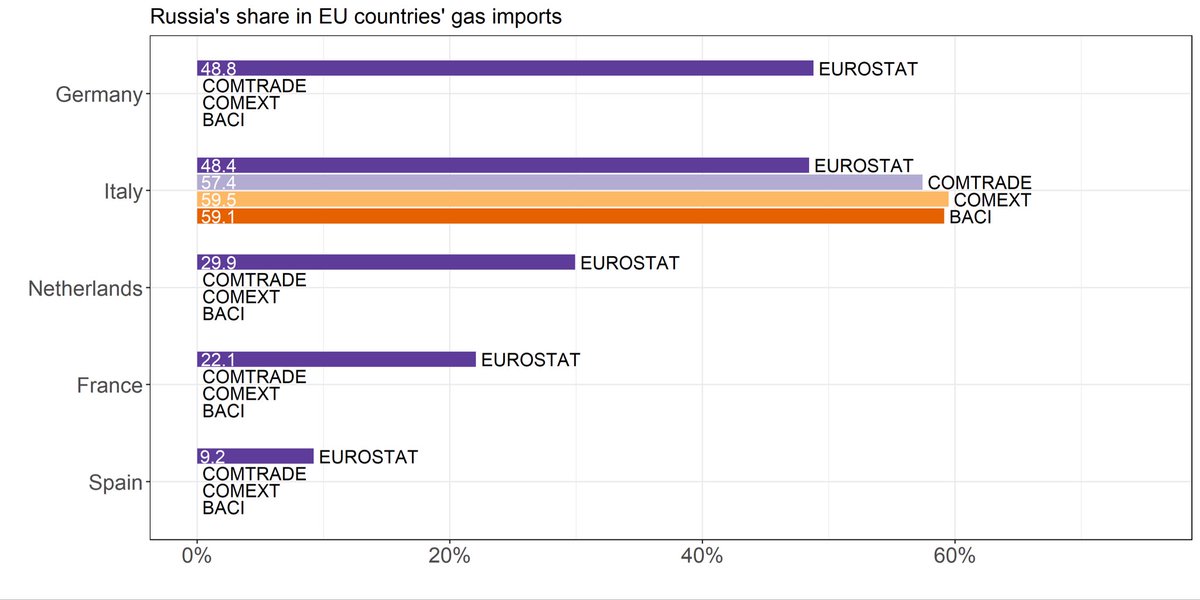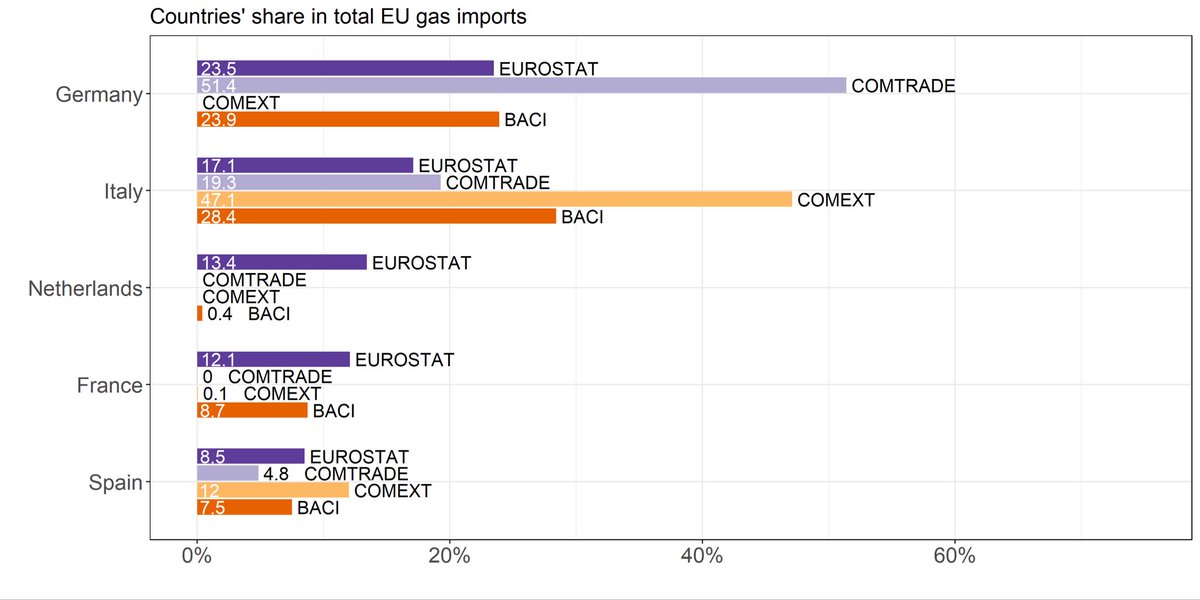
Why NOT to use trade statistics for gas trade
Many commentators intuitively turn to trade statistics to comment on the #embargo of oil and gas from 🇷🇺. With @CeciliaBellora and @PierreCotterlaz, we naturally did the same. But digging deeper we found problems. Here is why: a 🧵
Many commentators intuitively turn to trade statistics to comment on the #embargo of oil and gas from 🇷🇺. With @CeciliaBellora and @PierreCotterlaz, we naturally did the same. But digging deeper we found problems. Here is why: a 🧵
https://twitter.com/mschularick/status/1510586390710476808
Looking at the main databases #COMTRADE, #COMEXT and #BACI, we first found that 🇩🇪 did not import any natural gas from 🇷🇺 in 2019. In fact, 🇩🇪 does not report any bilateral information on gas imports, only a total in Comtrade and no information at all in Comext.
We compared trade data to figures from Eurostat’s energy statistic, which is based on questionnaires filled by grid operators. We look at the 5 biggest gas importers (🇩🇪🇮🇹🇳🇱🇫🇷🇪🇸). Of our 5 countries 4 do not report imports from 🇷🇺. The problem exists for many countries in 🇪🇺 

The only country in our small sample that (according to Comtrade, Comext and BACI) reports any gas imports from 🇷🇺 is 🇮🇹. The share of 🇷🇺, however, is quite high compared to Eurostat.
Unsurprisingly, the erroneous bilateral data aggregates to spurious shares of the 5 countries in total 🇪🇺 gas imports. Depending on the database, the share of 🇩🇪 in total 🇪🇺 gas imports, for example, varies tremendously. Using Comtrade, 🇩🇪 has a share… 

…in total 🇪🇺 gas imports of 51% (this large share is partly due to 🇫🇷 and 🇳🇱 not reporting imports at all). Using Comext, the share is 0. Looking at CEPII’s BACI, the share of 🇩🇪 seems correct, but this cannot be said of other countries (🇮🇹 and 🇳🇱).
The reasons for wrong data on natural gas trade are manifold. First, passing through pipelines, gas imports are not recorded by customs, the standard source for trade statistics.
Second, according to the Comext documentation, gas is sold several times on the market and thus the physical flow via pipelines is disconnected from the financial flow, making it hard to know the exact value of the flows (p. 88 of the document). ec.europa.eu/eurostat/docum…
Third, information on gas flows might be confidential. Hence, some countries might not publish information on their imports. This is the case for 🇫🇷, which does not report quantities of its gas imports due to confidentiality issues (source in French).
lekiosque.finances.gouv.fr/site_fr/NC8/Re…
lekiosque.finances.gouv.fr/site_fr/NC8/Re…
To conclude: when talking about natural gas imports, one shouldn’t turn to trade databases but instead rely on specialized sources. Below a list of alternative sources:
-EUROSTAT (only quantities): ec.europa.eu/eurostat/datab…
-IEA for global trade (cost: 570€): iea.org/data-and-stati…
-BP’s Statistical Review of World Energy for broad flows: bp.com/en/global/corp…
-IEA for global trade (cost: 570€): iea.org/data-and-stati…
-BP’s Statistical Review of World Energy for broad flows: bp.com/en/global/corp…
For more details including a comparison of trade in liquified natural gas and crude oil (working much better than natural gas) see our blog post:
cepii.fr/BLOG/en/post.a…
cepii.fr/BLOG/en/post.a…
Cc: @CEPII_Paris @VVicard @jsuedekum @MSchularick @SDullien @IsabellaMWeber @heimbergecon @adam_tooze @MonikaSchnitzer
• • •
Missing some Tweet in this thread? You can try to
force a refresh



